Blogs
Alcohol and Foot Care
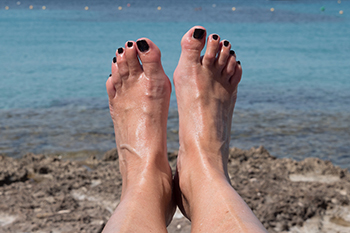
Although many people may have a casual interest in practicing daily foot care, the world of podiatry is expansive and many important pieces of information can help one improve their foot care routine. Importantly, the consumption of alcohol and alcoholic beverages can have a huge impact on one’s everyday foot care. This is because consuming alcohol is linked with several detrimental afflictions on the foot. Namely, drinking alcohol can lead to swelling of the feet, which is also known as edema. The reason for this is that alcohol negatively impacts how a person’s body processes electrolytes. As a result, more water may be present in the body, and swelling of the feet may occur. Additionally, consuming alcohol is linked with gout. Gout is a pesky kind of arthritis that primarily impacts the big toe on the feet. If you or someone you know is struggling with alcohol, consider the impact that the consumption is having on the feet and their health. For more information on alcohol-related foot ailments, please contact a podiatrist.
Everyday foot care is very important to prevent infection and other foot ailments. If you need your feet checked, contact Dr. Dean D. Hinners from Illinois. Our doctor can provide the care you need to keep you pain-free and on your feet.
Everyday Foot Care
Often, people take care of their bodies, face and hair more so than they do for their feet. But the feet are a very important aspect of our bodies, and one that we should pay more attention to. Without our feet, we would not be able to perform most daily tasks.
It is best to check your feet regularly to make sure there are no new bruises or cuts that you may not have noticed before. For dry feet, moisturizer can easily be a remedy and can be applied as often as necessary to the affected areas. Wearing shoes that fit well can also help you maintain good foot health, as well as making it easier to walk and do daily activities without the stress or pain of ill-fitting shoes, high heels, or even flip flops. Wearing clean socks with closed shoes is important to ensure that sweat and bacteria do not accumulate within the shoe. Clean socks help to prevent Athlete’s foot, fungi problems, bad odors, and can absorb sweat.
If you have any questions please feel free to contact one of our offices located in Metropolis and Eldorado, IL . We offer the newest diagnostic and treatment technologies for all your foot and ankle needs.
Can Hammertoe Be Treated?
 The foot condition that is known as hammertoe is often unsightly and can cause pain and discomfort. It is considered to be a deformity, and causes the second and third toe to bend upward, resembling a hammer. Many patients who have developed this condition realize it can be caused by wearing shoes that do not have adequate room for the toes to move freely in. This ailment may be the reason why corns or calluses can develop on top of the toes, and the affected toes may appear swollen. There are patients who find relief when appropriate foot and toe stretches are frequently performed. Additionally, mild relief may be found when a protective pad is worn on top of the toes while wearing shoes. In severe cases, surgery may be an option to permanently straighten the toes. If you have developed hammertoe, please speak to a podiatrist who can properly diagnose and treat this condition.
The foot condition that is known as hammertoe is often unsightly and can cause pain and discomfort. It is considered to be a deformity, and causes the second and third toe to bend upward, resembling a hammer. Many patients who have developed this condition realize it can be caused by wearing shoes that do not have adequate room for the toes to move freely in. This ailment may be the reason why corns or calluses can develop on top of the toes, and the affected toes may appear swollen. There are patients who find relief when appropriate foot and toe stretches are frequently performed. Additionally, mild relief may be found when a protective pad is worn on top of the toes while wearing shoes. In severe cases, surgery may be an option to permanently straighten the toes. If you have developed hammertoe, please speak to a podiatrist who can properly diagnose and treat this condition.
Hammertoes can be a painful condition to live with. For more information, contact Dr. Dean D. Hinners of Illinois. Our doctor will answer any of your foot- and ankle-related questions.
Hammertoe
Hammertoe is a foot deformity that occurs due to an imbalance in the muscles, tendons, or ligaments that normally hold the toe straight. It can be caused by the type of shoes you wear, your foot structure, trauma, and certain disease processes.
Symptoms
- Painful and/or difficult toe movement
- Swelling
- Joint stiffness
- Calluses/Corns
- Physical deformity
Risk Factors
- Age – The risk of hammertoe increases with age
- Sex – Women are more likely to have hammertoe compared to men
- Toe Length – You are more likely to develop hammertoe if your second toe is longer than your big toe
- Certain Diseases – Arthritis and diabetes may make you more likely to develop hammertoe
Treatment
If you have hammertoe, you should change into a more comfortable shoe that provides enough room for your toes. Exercises such as picking up marbles may strengthen and stretch your toe muscles. Nevertheless, it is important to seek assistance from a podiatrist in order to determine the severity of your hammertoe and see which treatment option will work best for you.
If you have any questions, please feel free to contact one of our offices located in Metropolis and Eldorado, IL . We offer the newest diagnostic and treatment technologies for all your foot care needs.
What Shoes Should I Wear if I Have Arthritis?
Many forms of arthritis affect the feet. Osteoarthritis, the form of arthritis associated with aging, is often accompanied by the development of bunions on the big toes. Shoes with a wider toe box can help avoid irritating the bunions. It is suggested that you avoid shoes with high heels or narrow, pointed toes, which can push the foot forward and compress the toes, thereby increasing pressure on the bunions and causing more pain. Rheumatoid arthritis often causes inflammation in the joints on the balls of the feet and the toes, leading to calluses and hammertoes. Rheumatoid arthritis can also cause lumps of soft tissue, called nodules, to form on the sides of the foot and rub against the shoes. To avoid foot pain associated with rheumatoid arthritis, wearing wide, box-toed shoes without laces is suggested. For more information about which types of shoes are best for arthritic foot pain, please consult with a podiatrist.
Arthritis can be a difficult condition to live with. If you are seeking treatment, contact Dr. Dean D. Hinners from Illinois. Our doctor can provide the care you need to keep you pain-free and on your feet.
Arthritic Foot Care
Arthritis is a joint disorder that involves the inflammation of different joints in your body, such as those in your feet. Arthritis is often caused by a degenerative joint disease and causes mild to severe pain in all affected areas. In addition to this, swelling and stiffness in the affected joints can also be a common symptom of arthritis.
In many cases, wearing ill-fitting shoes can worsen the effects and pain of arthritis. Wearing shoes that have a lower heel and extra room can help your feet feel more comfortable. In cases of rheumatoid arthritis, the arch in your foot may become problematic. Buying shoes with proper arch support that contour to your feet can help immensely.
Alleviating Arthritic Pain
- Exercises that stretch the foot can prevent further pain and injury and increase mobility
- Most of the pain can be alleviated with anti-inflammatory drugs, heat, and topical medications
- Massages can help temporarily alleviate pain.
It is best to see your doctor for the treatment that is right for your needs and symptoms. Conditions vary, and a podiatrist can help you determine the right method of care for your feet.
If you have any questions, please feel free to contact one of our offices located in Metropolis and Eldorado, IL . We offer the newest diagnostic tools and technology to treat your foot and ankle needs.
What Time of Day Should Running Shoes Be Purchased?
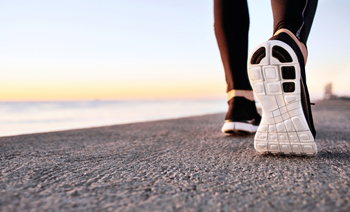 Research has shown that the importance of buying the correct shoes for running may be based on the amount of mileage that is covered and the type of running that is practiced. Additionally, many runners recognize that the shape of the foot may play a significant role in the style of shoe that is chosen. When purchasing shoes, it may be beneficial to try them on later in the day when the feet are typically at their largest. The toes must have enough room to move within the shoe, and the ankle and foot can maintain stability when the heel is solid. When socks that are worn for running are dusted with baby powder, excess moisture that may come from excess sweat may be absorbed and uncomfortable blisters may be avoided. If you would like additional information on how to choose the proper running shoe, please speak with a podiatrist.
Research has shown that the importance of buying the correct shoes for running may be based on the amount of mileage that is covered and the type of running that is practiced. Additionally, many runners recognize that the shape of the foot may play a significant role in the style of shoe that is chosen. When purchasing shoes, it may be beneficial to try them on later in the day when the feet are typically at their largest. The toes must have enough room to move within the shoe, and the ankle and foot can maintain stability when the heel is solid. When socks that are worn for running are dusted with baby powder, excess moisture that may come from excess sweat may be absorbed and uncomfortable blisters may be avoided. If you would like additional information on how to choose the proper running shoe, please speak with a podiatrist.
You should always make sure your running shoes fit properly in order to avoid injury. For more information, contact Dr. Dean D. Hinners from Illinois. Our doctor can provide the care you need to keep you pain-free and on your feet.
Choosing the Right Running Shoe for Your Foot Type
Improper shoe sizing can cause a myriad of problems for your feet. Shoes that don’t fit you properly can lead to muscular imbalances in your body, which can result in foot, knee, and hip injuries.
Tips for Finding the Right Running Shoe
- Make sure you have a thumb’s width of wiggle room between the end of your longest toe and the front of the shoe.
- There should be little to no slipping at the heel
- Don’t assume your size in one shoe brand will be your size in another
- Do not lace up your shoes too tightly
- Walk around in the store with your new shoes before you buy them
If you have any questions please feel free to contact our one of our offices located in Metropolis and Eldorado, IL . We offer the newest diagnostic and treatment technologies for all your foot and ankle needs.
Four Tips for Healthy Feet
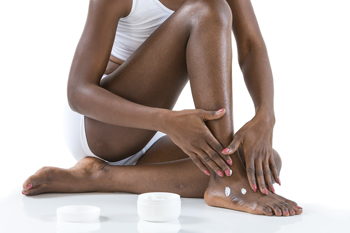 Your feet carry you throughout your life, supporting the weight of your body. Maintaining the health of your feet is essential and there are many simple ways to keep the feet healthy. Check your feet regularly for any abnormalities, such as cracks, cuts, scrapes, sores, or discoloration. If caught early, most foot problems can be promptly and effectively treated by a podiatrist. Visually checking your feet is especially important if you have medical conditions like diabetes, poor circulation, or peripheral neuropathy, as you may not feel or notice an injury until it has progressed significantly. Keep your feet clean by washing them with soap and water and drying them thoroughly, especially in the area between the toes. Wear shoes that fit comfortably and trim your toenails regularly. For more information about everyday foot care, please speak with a podiatrist.
Your feet carry you throughout your life, supporting the weight of your body. Maintaining the health of your feet is essential and there are many simple ways to keep the feet healthy. Check your feet regularly for any abnormalities, such as cracks, cuts, scrapes, sores, or discoloration. If caught early, most foot problems can be promptly and effectively treated by a podiatrist. Visually checking your feet is especially important if you have medical conditions like diabetes, poor circulation, or peripheral neuropathy, as you may not feel or notice an injury until it has progressed significantly. Keep your feet clean by washing them with soap and water and drying them thoroughly, especially in the area between the toes. Wear shoes that fit comfortably and trim your toenails regularly. For more information about everyday foot care, please speak with a podiatrist.
Everyday foot care is very important to prevent infection and other foot ailments. If you need your feet checked, contact Dr. Dean D. Hinners from Illinois. Our doctor can provide the care you need to keep you pain-free and on your feet.
Everyday Foot Care
Often, people take care of their bodies, face and hair more so than they do for their feet. But the feet are a very important aspect of our bodies, and one that we should pay more attention to. Without our feet, we would not be able to perform most daily tasks.
It is best to check your feet regularly to make sure there are no new bruises or cuts that you may not have noticed before. For dry feet, moisturizer can easily be a remedy and can be applied as often as necessary to the affected areas. Wearing shoes that fit well can also help you maintain good foot health, as well as making it easier to walk and do daily activities without the stress or pain of ill-fitting shoes, high heels, or even flip flops. Wearing clean socks with closed shoes is important to ensure that sweat and bacteria do not accumulate within the shoe. Clean socks help to prevent Athlete’s foot, fungi problems, bad odors, and can absorb sweat.
If you have any questions please feel free to contact one of our offices located in Metropolis and Eldorado, IL . We offer the newest diagnostic and treatment technologies for all your foot and ankle needs.
What Causes Morton’s Neuroma?
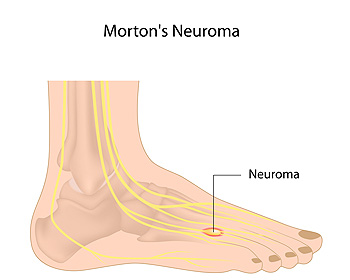 If you have a condition that is known as Morton’s neuroma, you may notice pain in the ball of the foot. This may be a result of an irritated nerve that has become enlarged, and may occur between the third and fourth toes. Patients who are afflicted with this condition may notice a burning sensation in the sole of the foot, in addition to the toes possibly becoming numb. A common reason why Morton’s neuroma may develop may include wearing shoes that are too tight, or choosing footwear that does not provide adequate room for the toes to move freely in. This may cause pressure to be exerted on the nerves in the toes, which may cause pain and discomfort. Existing medical conditions may precede the development of Morton’s neuroma, and these may include bunions, hammertoes, or flat feet. Mild relief may be found in resting the foot, and performing gentle stretching exercises. If you have symptoms of this condition, it is advised that you consult with a podiatrist who can properly treat Morton’s neuroma.
If you have a condition that is known as Morton’s neuroma, you may notice pain in the ball of the foot. This may be a result of an irritated nerve that has become enlarged, and may occur between the third and fourth toes. Patients who are afflicted with this condition may notice a burning sensation in the sole of the foot, in addition to the toes possibly becoming numb. A common reason why Morton’s neuroma may develop may include wearing shoes that are too tight, or choosing footwear that does not provide adequate room for the toes to move freely in. This may cause pressure to be exerted on the nerves in the toes, which may cause pain and discomfort. Existing medical conditions may precede the development of Morton’s neuroma, and these may include bunions, hammertoes, or flat feet. Mild relief may be found in resting the foot, and performing gentle stretching exercises. If you have symptoms of this condition, it is advised that you consult with a podiatrist who can properly treat Morton’s neuroma.
Morton’s neuroma is a very uncomfortable condition to live with. If you think you have Morton’s neuroma, contact Dr. Dean D. Hinners of Illinois. Our doctor will attend to all of your foot care needs and answer any of your related questions.
Morton’s Neuroma
Morton's neuroma is a painful foot condition that commonly affects the areas between the second and third or third and fourth toe, although other areas of the foot are also susceptible. Morton’s neuroma is caused by an inflamed nerve in the foot that is being squeezed and aggravated by surrounding bones.
What Increases the Chances of Having Morton’s Neuroma?
- Ill-fitting high heels or shoes that add pressure to the toe or foot
- Jogging, running or any sport that involves constant impact to the foot
- Flat feet, bunions, and any other foot deformities
Morton’s neuroma is a very treatable condition. Orthotics and shoe inserts can often be used to alleviate the pain on the forefront of the feet. In more severe cases, corticosteroids can also be prescribed. In order to figure out the best treatment for your neuroma, it’s recommended to seek the care of a podiatrist who can diagnose your condition and provide different treatment options.
If you have any questions, please feel free to contact one of our offices located in Metropolis and Eldorado, IL . We offer the newest diagnostic and treatment technologies for all your foot care needs.
Why Flip-Flops Can Be Dangerous for Your Feet
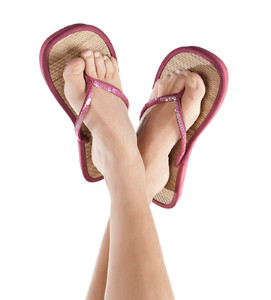 While flip-flops may be convenient to wear around the pool and locker rooms, they should not be worn for long periods of time. The only benefit that these shoes provide is that they can help protect you from infection, but they tend to do more harm than good for your feet. Typically, flip-flops fail to provide your feet with arch support, which may cause your natural foot arch to collapse. As a result, other parts of your body, such as your hip and back, may be disrupted. Nevertheless, the key to wearing flip-flops is moderation. It is crucial that you only wear these shoes for short periods of time in order to prevent long-term damage to your feet.
While flip-flops may be convenient to wear around the pool and locker rooms, they should not be worn for long periods of time. The only benefit that these shoes provide is that they can help protect you from infection, but they tend to do more harm than good for your feet. Typically, flip-flops fail to provide your feet with arch support, which may cause your natural foot arch to collapse. As a result, other parts of your body, such as your hip and back, may be disrupted. Nevertheless, the key to wearing flip-flops is moderation. It is crucial that you only wear these shoes for short periods of time in order to prevent long-term damage to your feet.
Flip-flops are not always the best choice of footwear. If you have any concerns about your feet or ankles, contact Dr. Dean D. Hinners from Illinois. Our doctor will assist you with all of your foot and ankle needs.
Flip-Flops and Feet
When the weather starts warming up, people enjoy wearing flip-flops. Flip-flops are comfortable, stylish, and easy to slip on and off; they're perfect for any summer beach goer. However, these shoes can cause harm to the feet.
How Can Flip-Flops Affect Me Long-Term?
- Ankle problems
- Hip problems
- Lower back problems
- Pain in the balls of the feet
- Problems with foot arches
- Changes in the way you walk
Are There Injuries Associated with Flip-Flops?
Yes. Since flip-flops are relatively weak and do not provide the same amount of support as sneakers, people who wear flip-flops regularly are more susceptible to injuries. On top of that, the open nature of the shoe makes your feet more prone to other problems, such as cuts and even infections. Common injuries and ailments include:
- Sprained ankles
- Blisters
- Infections
- Cuts and Scrapes
I like Wearing Flip-Flops. Are There Safe Alternatives?
When buying flip-flops, try to find ones that have sturdy soles and that are made of high-quality materials that will support for your feet. These flip-flops will cost more but will also last longer as a result.
If you have any questions please feel free to contact one of our offices located in Metropolis and Eldorado, IL . We offer the newest diagnostic and treatment technologies for all your foot and ankle needs.
Are Cracked Heels a Common Ailment?
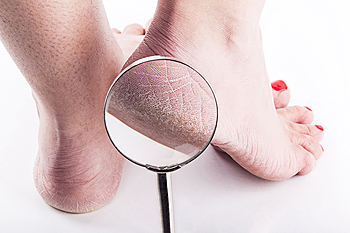 Cracked heels is a common condition that many people worldwide may experience. It may develop as a result of wearing shoes that have an open back, or from standing for extended periods of time throughout the day. In severe cases, this ailment may produce pain and discomfort, especially while walking or running. Some patients find mild relief when the feet are washed in warm water and dried thoroughly, followed by applying a good moisturizer. It may also be beneficial to drink plenty of water and to protect the heels by wearing comfortable shoes. If you have cracked heels, it’s suggested that you consult with a podiatrist who can offer the proper treatment options for this condition.
Cracked heels is a common condition that many people worldwide may experience. It may develop as a result of wearing shoes that have an open back, or from standing for extended periods of time throughout the day. In severe cases, this ailment may produce pain and discomfort, especially while walking or running. Some patients find mild relief when the feet are washed in warm water and dried thoroughly, followed by applying a good moisturizer. It may also be beneficial to drink plenty of water and to protect the heels by wearing comfortable shoes. If you have cracked heels, it’s suggested that you consult with a podiatrist who can offer the proper treatment options for this condition.
Cracked heels are unsightly and can cause further damage to your shoes and feet. If you have any concerns, contact Dr. Dean D. Hinners from Illinois. Our doctor can provide the care you need to keep you pain-free and on your feet.
Cracked Heels
Cracked heels appear unappealing and can make it harder for you walk around in sandals. Aside from looking unpleasant, cracked heels can also tear stockings, socks, and wear out your shoes. There are several methods to help restore a cracked heel and prevent further damage.
How Do You Get Them?
Dry skin is the number one culprit in creating cracked heels. Many athletes, walkers, joggers, and even swimmers suffer from cracked heels. Age and skin oil production play a role to getting cracked heels as well.
Promote Healing
Over the counter medicines can help, especially for those that need instant relief or who suffer from chronic dry feet.
Wear Socks – Wearing socks with medicated creams helps lock in moisture.
Moisturizers – Applying both day and night will help alleviate dryness which causes cracking.
Pumice Stones – These exfoliate and remove dead skin, which allows for smoother moisturizer application and better absorption into the skin.
Change in Diet
Eating healthy with a well-balanced diet will give the skin a fresh and radiant look. Your body responds to the kinds of food you ingest. Omega-3 fatty acids and zinc supplements can also revitalize skin tissue.
Most importantly, seek professional help if unsure how to proceed in treating cracked heels. A podiatrist will help you with any questions or information needed.
If you have any questions, please feel free to contact one of our offices located in Metropolis and Eldorado, IL . We offer the newest diagnostic and treatment technologies for all your foot care needs.
What are the Symptoms of Flat Feet?
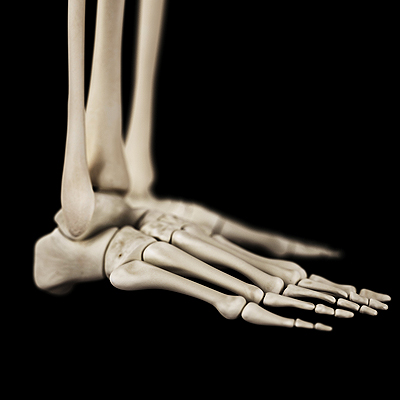 If you have flat feet, you may have noticed the arches in your feet are nonexistent. This condition is also referred to as fallen arches, and the feet may experience pain and discomfort. This is evident because the foot will lie completely flat on the floor, and may roll inward. There may be several reasons for this to occur, including arthritic conditions that may affect the joints and tendons, obesity, which puts additional pressure on the feet, and weakness of the nerves due to diabetes. Some of the symptoms that may be experienced can include stiffness in the foot, pain inside the ankle, or possibly a feeling of imbalance. Performing specific foot exercises may be helpful in alleviating the discomfort that may be associated with flat feet. If you have this condition, it’s suggested to schedule a consultation with a podiatrist who can suggest treatment options.
If you have flat feet, you may have noticed the arches in your feet are nonexistent. This condition is also referred to as fallen arches, and the feet may experience pain and discomfort. This is evident because the foot will lie completely flat on the floor, and may roll inward. There may be several reasons for this to occur, including arthritic conditions that may affect the joints and tendons, obesity, which puts additional pressure on the feet, and weakness of the nerves due to diabetes. Some of the symptoms that may be experienced can include stiffness in the foot, pain inside the ankle, or possibly a feeling of imbalance. Performing specific foot exercises may be helpful in alleviating the discomfort that may be associated with flat feet. If you have this condition, it’s suggested to schedule a consultation with a podiatrist who can suggest treatment options.
Flatfoot is a condition many people suffer from. If you have flat feet, contact Dr. Dean D. Hinners from Illinois. Our doctor will treat your foot and ankle needs.
What Are Flat Feet?
Flatfoot is a condition in which the arch of the foot is depressed and the sole of the foot is almost completely in contact with the ground. About 20-30% of the population generally has flat feet because their arches never formed during growth.
Conditions & Problems:
Having flat feet makes it difficult to run or walk because of the stress placed on the ankles.
Alignment – The general alignment of your legs can be disrupted, because the ankles move inward which can cause major discomfort.
Knees – If you have complications with your knees, flat feet can be a contributor to arthritis in that area.
Symptoms
- Pain around the heel or arch area
- Trouble standing on the tip toe
- Swelling around the inside of the ankle
- Flat look to one or both feet
- Having your shoes feel uneven when worn
Treatment
If you are experiencing pain and stress on the foot you may weaken the posterior tibial tendon, which runs around the inside of the ankle.
If you have any questions please feel free to contact one of our offices located in Metropolis and Eldorado, IL . We offer the newest diagnostic and treatment technologies for all your foot and ankle needs.
To Wear or Not To Wear High Heels
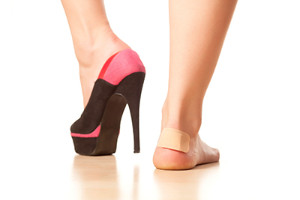 Wearing high heels may negate the fact that the feet act as shock absorbers. If proper shoes are worn, cushioning in the soles of the shoes generally protects the body from the constant battering incurred while walking and running. However, if the choice to wear high heels is made, the body’s weight shifts onto the balls of the feet, forcing the toes to be crammed into a small area and potentially resulting in all kinds of conditions. There are typically several reasons to avoid wearing high heels, one of which is abnormal movement occurring in the ankles. This can result from the foot being forced to bend forward, possibly restricting circulation in the feet. Additionally, the Achilles tendon is often affected which may cause pain in the calves. If high heels are consistently worn, the ankle and calf tendons may lose flexibility, making it difficult to walk. Good advice is to wear high heels as little as possible.
Wearing high heels may negate the fact that the feet act as shock absorbers. If proper shoes are worn, cushioning in the soles of the shoes generally protects the body from the constant battering incurred while walking and running. However, if the choice to wear high heels is made, the body’s weight shifts onto the balls of the feet, forcing the toes to be crammed into a small area and potentially resulting in all kinds of conditions. There are typically several reasons to avoid wearing high heels, one of which is abnormal movement occurring in the ankles. This can result from the foot being forced to bend forward, possibly restricting circulation in the feet. Additionally, the Achilles tendon is often affected which may cause pain in the calves. If high heels are consistently worn, the ankle and calf tendons may lose flexibility, making it difficult to walk. Good advice is to wear high heels as little as possible.
High heels have a history of causing foot and ankle problems. If you have any concerns about your feet or ankles, contact Dr. Dean D. Hinners from Illinois. Our doctor can provide the care you need to keep you pain-free and on your feet.
Effects of High Heels on the Feet
High heels are popular shoes among women because of their many styles and societal appeal. Despite this, high heels can still cause many health problems if worn too frequently.
Which Parts of My Body Will Be Affected by High Heels?
- Ankle Joints
- Achilles Tendon – May shorten and stiffen with prolonged wear
- Balls of the Feet
- Knees – Heels cause the knees to bend constantly, creating stress on them
- Back – They decrease the spine’s ability to absorb shock, which may lead to back pain. The vertebrae of the lower back may compress.
What Kinds of Foot Problems Can Develop from Wearing High Heels?
- Corns
- Calluses
- Hammertoe
- Bunions
- Morton’s Neuroma
- Plantar Fasciitis
How Can I Still Wear High Heels and Maintain Foot Health?
If you want to wear high heeled shoes, make sure that you are not wearing them every day, as this will help prevent long term physical problems. Try wearing thicker heels as opposed to stilettos to distribute weight more evenly across the feet. Always make sure you are wearing the proper shoes for the right occasion, such as sneakers for exercising. If you walk to work, try carrying your heels with you and changing into them once you arrive at work. Adding inserts to your heels can help cushion your feet and absorb shock. Full foot inserts or metatarsal pads are available.
If you have any questions please feel free to contact one of our offices located in Metropolis and Eldorado, IL . We offer the newest diagnostic and treatment technologies for all your foot and ankle needs.
More...
Foot Pain and Walking
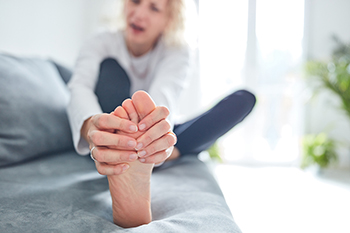 Foot pain may become worse while walking. Many patients experience occasional aches and pains in their feet, and chronic pain may indicate serious or underlying foot conditions. Pain in the heel may represent plantar fasciitis, which is an inflammation of the plantar fascia. This is the portion of tissue that connects the heel to the toes, and may feel worse upon arising in the morning. A condition that affects the nerves in the foot may indicate Morton’s neuroma, and the pain is often felt in the ball of the foot. In severe cases, it may gravitate to the toes, which can cause the entire foot to feel uncomfortable. There are several types of tendinitis that can cause severe pain. When the Achilles tendon is affected, the heel and calf are targeted. Extensor tendonitis can cause the top of the foot pain and discomfort, and the outside and back of the foot can be affected by peroneal tendonitis. Any type of foot pain warrants a visit to the podiatrist, who can properly diagnose and treat painful foot conditions.
Foot pain may become worse while walking. Many patients experience occasional aches and pains in their feet, and chronic pain may indicate serious or underlying foot conditions. Pain in the heel may represent plantar fasciitis, which is an inflammation of the plantar fascia. This is the portion of tissue that connects the heel to the toes, and may feel worse upon arising in the morning. A condition that affects the nerves in the foot may indicate Morton’s neuroma, and the pain is often felt in the ball of the foot. In severe cases, it may gravitate to the toes, which can cause the entire foot to feel uncomfortable. There are several types of tendinitis that can cause severe pain. When the Achilles tendon is affected, the heel and calf are targeted. Extensor tendonitis can cause the top of the foot pain and discomfort, and the outside and back of the foot can be affected by peroneal tendonitis. Any type of foot pain warrants a visit to the podiatrist, who can properly diagnose and treat painful foot conditions.
Foot Pain
Foot pain can be extremely painful and debilitating. If you have a foot pain, consult with Dr. Dean D. Hinners from Illinois. Our doctor will assess your condition and provide you with quality foot and ankle treatment.
Causes
Foot pain is a very broad condition that could be caused by one or more ailments. The most common include:
- Bunions
- Hammertoes
- Plantar Fasciitis
- Bone Spurs
- Corns
- Tarsal Tunnel Syndrome
- Ingrown Toenails
- Arthritis (such as Gout, Rheumatoid, and Osteoarthritis)
- Flat Feet
- Injury (from stress fractures, broken toe, foot, ankle, Achilles tendon ruptures, and sprains)
- And more
Diagnosis
To figure out the cause of foot pain, podiatrists utilize several different methods. This can range from simple visual inspections and sensation tests to X-rays and MRI scans. Prior medical history, family medical history, and any recent physical traumatic events will all be taken into consideration for a proper diagnosis.
Treatment
Treatment depends upon the cause of the foot pain. Whether it is resting, staying off the foot, or having surgery; podiatrists have a number of treatment options available for foot pain.
If you have any questions, please feel free to contact one of our offices located in Metropolis and Eldorado, IL . We offer the newest diagnostic and treatment technologies for all your foot care needs.
Understanding Your Child’s Heel Pain
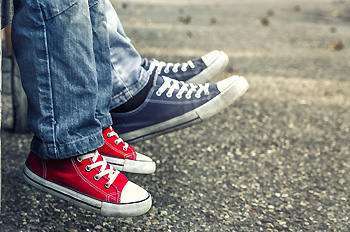 Your child may experience heel pain during a growth spurt. This condition is commonly known as Sever’s disease. Since the heel grows faster than the rest of the leg, the tendons experience extra strain. Symptoms of Sever’s disease include pain in one or both of the heels, tenderness that increases during exercise, and trouble walking. Oftentimes, the best treatment is rest. The condition does not cause long-term issues and should subside after a few months. However, sometimes doctors will recommend that a child takes NSAIDs such as ibuprofen, performs stretching routines, and wears supportive shoes. Be especially cognizant for Sever’s disease if your child plays a sport that includes running or jumping on hard surfaces. If your child is experiencing heel pain, be sure to contact a podiatrist.
Your child may experience heel pain during a growth spurt. This condition is commonly known as Sever’s disease. Since the heel grows faster than the rest of the leg, the tendons experience extra strain. Symptoms of Sever’s disease include pain in one or both of the heels, tenderness that increases during exercise, and trouble walking. Oftentimes, the best treatment is rest. The condition does not cause long-term issues and should subside after a few months. However, sometimes doctors will recommend that a child takes NSAIDs such as ibuprofen, performs stretching routines, and wears supportive shoes. Be especially cognizant for Sever’s disease if your child plays a sport that includes running or jumping on hard surfaces. If your child is experiencing heel pain, be sure to contact a podiatrist.
Sever's disease often occurs in children and teens. If your child is experiencing foot or ankle pain, see Dr. Dean D. Hinners from Illinois. Our doctor can treat your child’s foot and ankle needs.
Sever’s Disease
Sever’s disease is also known as calcaneal apophysitis, which is a medical condition that causes heel pain I none or both feet. The disease is known to affect children between the ages of 8 and 14.
Sever’s disease occurs when part of the child’s heel known as the growth plate (calcaneal epiphysis) is attached to the Achilles tendon. This area can suffer injury when the muscles and tendons of the growing foot do not keep pace with bone growth. Therefore, the constant pain which one experiences at the back of the heel will make the child unable to put any weight on the heel. The child is then forced to walk on their toes.
Symptoms
Acute pain – Pain associated with Sever’s disease is usually felt in the heel when the child engages in physical activity such as walking, jumping and or running.
Highly active – Children who are very active are among the most susceptible in experiencing Sever’s disease, because of the stress and tension placed on their feet.
If you have any questions, please feel free to contact one of our offices located in Metropolis and Eldorado, IL . We offer the newest diagnostic and treatment technologies for all your foot and ankle injuries.
Common Foot Injuries Among Tennis Players
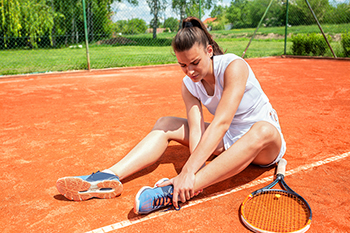
With being on one’s feet the whole time while playing tennis, one is very likely to sustain a foot injury at some point while participating in this sport. The most common of such injuries include heel spurs, stress fractures, and tennis toe. A heel spur is a calcium buildup under the heel from straining or stretching the plantar fascia. It is common among athletes who pound their feet on the court and/or wear ill-fitting shoes that do not have enough support. Stress fractures are overuse injuries that come on from wear and tear. They can happen when muscles become fatigued or unable to absorb shock, and small cracks develop in bones. These types of fractures occur when activity levels are increased suddenly, or tennis is played on a new surface. Tennis toe is when blood pools under the big toenail and is generally caused by friction from the toenail rubbing against the shoe. If you experience foot and ankle pain from playing tennis, consult with a podiatrist who can diagnose the problem and provide proper treatment.
Ankle and foot injuries are common among athletes and in many sports. They can be caused by several problems and may be potentially serious. If you are feeling pain or think you were injured in a sporting event or when exercising, consult with Dr. Dean D. Hinners from Illinois. Our doctor will assess your condition and provide you with quality foot and ankle treatment.
Common Injuries
The most common injuries that occur in sporting activities include:
- Achilles Tendonitis
- Achilles Tendon Rupture
- Ankle Sprains
- Broken Foot
- Plantar Fasciitis
- Stress Fractures
- Turf Toe
Symptoms
Symptoms vary depending upon the injury and in some cases, there may be no symptoms at all. However, in most cases, some form of symptom is experienced. Pain, aching, burning, bruising, tenderness, tightness or stiffness, sensation loss, difficulty moving, and swelling are the most common symptoms.
Treatment
Just as symptoms vary depending upon the injury, so do treatment options. A common treatment method is known as the RICE method. This method involves rest, applying ice, compression and elevating the afflicted foot or ankle. If the injury appears to be more serious, surgery might be required, such as arthroscopic or reconstructive surgery. Lastly, rehabilitation or therapy might be needed to gain full functionality in the afflicted area. Any discomfort experienced by an athlete must be evaluated by a licensed, reputable medical professional.
If you have any questions, please feel free to contact one of our offices located in Metropolis and Eldorado, IL . We offer the newest diagnostic and treatment technologies for all your foot care needs.
Flip Flops May Be Dangerous to Wear
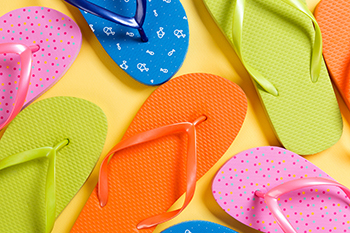
Many people enjoy wearing flip flops in the summer months. These types of shoes are constructed with a soft sole, and straps on top of the shoe are held together by a thin piece of material, which is worn between the first and second toe. This is necessary in keeping the shoe on the foot, and their simplicity and numerous colors can make flip flops desirable to wear. Conversely, studies have shown that the more flip flops are worn, the greater the possibility of having aching feet. This may be from flip flops having minimal support, and the gait or walking style may be altered from the lack of cushioning. This generally provides adequate shock absorption as walking is done throughout the day, and heel pain may occur when this is missing from the shoe. Additionally, the toes may hurt from gripping the top of the shoe to keep it on the foot, and the arch may begin to hurt. If you would like more information about how frequently wearing flip flops can affect your feet, please consult a podiatrist who can guide you toward wearing shoes that are solidly constructed.
Flip-flops are not always the best choice of footwear. If you have any concerns about your feet or ankles, contact Dr. Dean D. Hinners from Illinois. Our doctor will assist you with all of your foot and ankle needs.
Flip-Flops and Feet
When the weather starts warming up, people enjoy wearing flip-flops. Flip-flops are comfortable, stylish, and easy to slip on and off; they're perfect for any summer beach goer. However, these shoes can cause harm to the feet.
How Can Flip-Flops Affect Me Long-Term?
- Ankle problems
- Hip problems
- Lower back problems
- Pain in the balls of the feet
- Problems with foot arches
- Changes in the way you walk
Are There Injuries Associated with Flip-Flops?
Yes. Since flip-flops are relatively weak and do not provide the same amount of support as sneakers, people who wear flip-flops regularly are more susceptible to injuries. On top of that, the open nature of the shoe makes your feet more prone to other problems, such as cuts and even infections. Common injuries and ailments include:
- Sprained ankles
- Blisters
- Infections
- Cuts and Scrapes
I like Wearing Flip-Flops. Are There Safe Alternatives?
When buying flip-flops, try to find ones that have sturdy soles and that are made of high-quality materials that will support for your feet. These flip-flops will cost more but will also last longer as a result.
If you have any questions please feel free to contact one of our offices located in Metropolis and Eldorado, IL . We offer the newest diagnostic and treatment technologies for all your foot and ankle needs.

